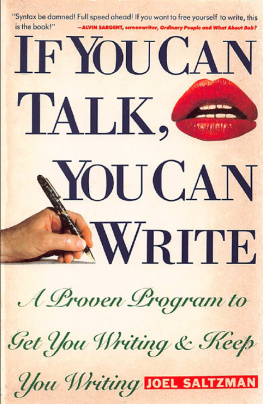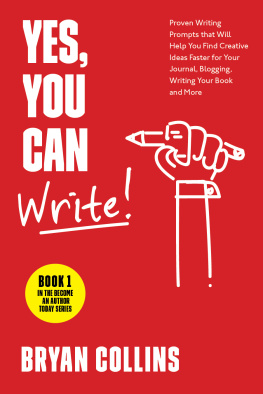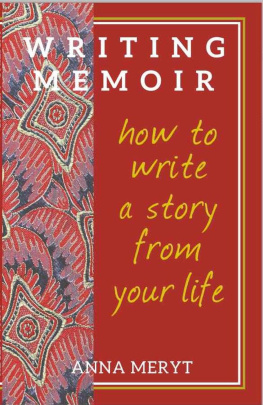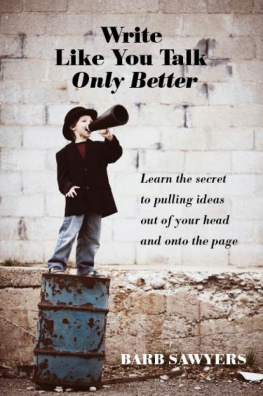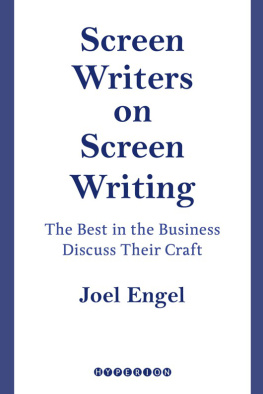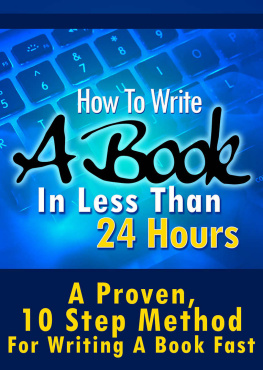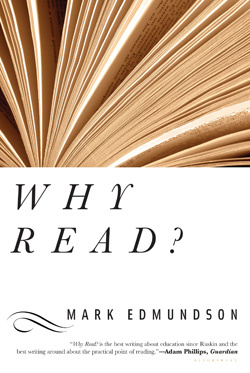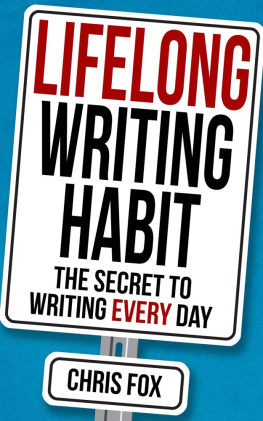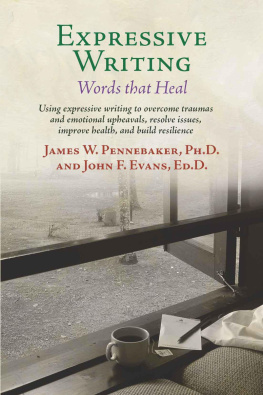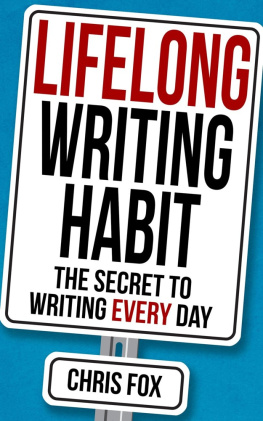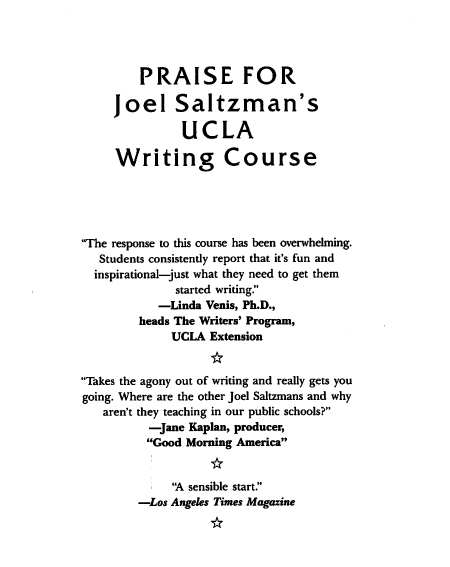If you purchase this book without a cover you should be aware that this book may have been stolen property and reported as unsold and destroyed to the publisher. In such case neither the author nor the publisher has received any payment for this stripped book.
Grateful acknowledgment is given to reprint from the following:
Elephant by Raymond Carver. From Where Im Calling From, Vintage Contemporaries, Random House. Copyright 1986, 1987, 1988 by Raymond Carver.
Geek Love, by Katherine Dunn, Alfred A. Knopf, Inc. Copyright 1983, 1988, and 1989 by Katherine Dunn.
From the screenplay Bull Durham, by Ron Shelton. Copyright 1988 Orion Pictures Corporation, All Rights Reserved.
Material from Ameliorating the Image, Spring 1990
Fighting Knives Magazine, used by permission of the publisher, L.F.P., Inc.
Copyright 1990.
Excerpts from Some Dreamers of the Golden Dream. From Slouching Towards Bethlehem by Joan Didion. Copyright 1966, 1968 by Joan Didion. Reprinted by permission of Farrar, Straus & Giroux, Inc.
A Yellow Rafi in Blue Water by Michael Dorris. Copyright 1987 by Michael Dorris. Reprinted by permission of Henry Holt and Company, Inc.
I Must Say by Edwin Newman. Copyright 1988 by Edwin Newman. Reprinted by permission of Warner Books.
1993, 2014 Joel Saltzman
Printed in the United States of America
First Printing: October 1993
ISBN 978-1-931657-11-2
Library of Congress Cataloging-in-Publication Data
Saltzman, Joel.
If you can talk, you can write / Joel Saltzman.
p. cm.
1. Authorship. I. Title.
Book design; H. Roberts
To my sister Linda,
who let me steal her typewriter
when I was eleven.
And to Deborah,
who let me steal her heart
when I was older.
INTRODUCTION:
FIVE YEARS OF
WRITERS BLOCK
When I first started writing, I was fearless. Zooming down the page, Id fill it up with whatever crossed my mind writing fast, furious, with total abandon. Those were great, exciting times, but they would not last forever.
After college, living in New York City, it seemed like everyone was a writer. They were working on novels, writing plays and destined for greatness. Or so I convinced myself. These were real writers; I was a fake and it was only a matter of time before they found me out. So I tricked themdropped out from writing and spent the next five years not writing a word.
It was agony, my personal Dark Ages. There were days when I actually considered throwing my typewriter out the window, and myself right after it.
Finallyand youll find out how on the first page of Chapter OneI got back to writing. My skin cleared up, my friends stopped avoiding me and I discovered the most important thing I will ever learn about writing:
ITS EASIER TO WRITE THAN NOT TO WRITE.
This book is about getting you to writewith optimism, enthusiasm, and only occasionally wanting to kill yourself.
Its the life preserver I had to invent on my own.
ACKNOWLEDGMENTS
First to be thanked, for letting me publish their work without getting paid for it, are friends and students Linda Allen, Renee Caputo, Carrie Freeman, David Hoffinger, Sara Kaufman, C. R. Robin, Elizabeth Rostand, Ilene Shaw, Mimi Starrett, Justine Weinberg, Linda Wilson and Madeline Wolfe. Congratulations, you can now say youre published.
For inspiration and advice, grateful thanks to Chef Michael Baum, Leo Janos, Angela Rinaldi, Gordon Sander, Harv Zimmel and Francisca Matos, who kept telling me I had a great idea until I finally believed her.
For leading me to various quotes, quips and useful information, gratitude to Mary Camou, Robert DawidofF, Dana Dovitch, David Freeman, Karen Langsam, Richard Marcus, Charles McCaughn and Dan Stern.
For not hanging up on me when a complete stranger called to pick their brains, gratitude as well to fellow writers A. Scott Berg and Grace Glueck.
For guiding me through some of the legal stuff so I could sleep at night, a sigh of thanks to attorney and sage F. Robert Stein.
For wisdom and support, thanks as well to my agent, Harvey Klinger, who got me to Warner Books, and to my editor, Collen Kapklein, who got me through it with barely a scratch.
And the ultimate thanks to my students, past and present, for allowing me to go through lots of blah, blah, blah till I found the gold.
Joel Saltzman
Los Angeles
1993
THE FORTUNE COOKIE THAT SAVED MY LIFE
One night, still in the throes of agonizing writers block, I got a fortune cookie that saved my life. My fortune read:
TO AVOID BEING DISAPPOINTED, MINIMIZE EXPECTATIONS.
Not being a true believer in the Fortune Cookie School of Wisdom, I was about to toss it aside, eat my cookie and never think of it again. But there was something about those words that almost made sense to me.
What if I did lower my expectationsreally lowered them? What if I said to myself: I dont care if it makes any sense or not. Whatevers in my head, Im going to write it down.
Suddenly, it hit me: Thats how I started writing in the firstplace. I was eleven years old, banging away at an old Royal typewriter, not a worry in the world.
That night, I started writing again, the same way Id started out as a kidjust for the hell of it. I was fooling around again, having fun on the page, finger painting with words and ideas. I didnt care how crazy, or wild, or silly it got. It got me going again and thats all that mattered.
It wasnt great writing, but it was writing. The dry spell was over. Having lowered my expectations, I wasnt disappointed; I was elated.

I used to throw things out saying, This isnt great. It didnt occur to me that it didnt have to be great.
William Saroyan

IF AT FIRST YOU DONT SUCCEED, DONT BE S URPRISED
For some reason everyone thinks, I should know how to write. No one thinks, I should know how to play the piano. But when it comes to writing, I should know how to do it.
What if I told you a story about a man who buys a piano, sits down to play for the very first time and is shocked when he doesnt sound like Arthur Rubinstein?
I dont understand, he complains. Ive listened to lots of music, I should know how to play the piano.
Ridiculous, you say? Yet there you are: Banging away at the typewriter, youre mortified when your work isnt as good as Ernest Hemingways. Hell, it isnt as good as ErnestGoes to Camp.
Worse yet, you start blaming yourself, beating yourself up for not getting it perfect the first time out. Suddenly, hammering away at you is a tiny voice that keeps growing louder, an inner monologue that keeps telling you: I cant do this, I dont know how to write. Ill never get it right. Ill lose my job. My house. My familys going to abandon me. Ill starve to death, die in a ditch and no one will even care.
And why are all these terrible things going to happen to you? Because you just tried to write a one-page letter and it should be perfect but its not even close. Ive got news for you:

